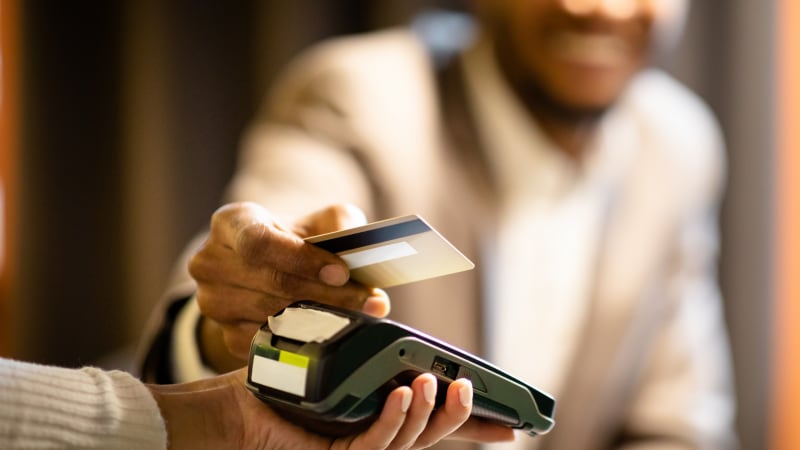How to dispute a credit card charge

Quick insights
- A credit card dispute occurs when a consumer asks their card issuer to investigate and potentially reverse a transaction they believe is incorrect or unauthorized.
- Billing errors, suspicious activity and issues with goods/services are some common reasons for credit card disputes.
- Steps to dispute a charge may include contacting the merchant, gathering evidence, and contacting the credit card issuer.
Whether it’s due to an error, suspicious charge or dissatisfaction with the goods or services provided, you have the right as a consumer to dispute a credit card charge. Credit card charges can be disputed by calling the card issuer, and some credit cards allow you to submit disputes online or by mail. Before contacting your credit card issuer, contact the merchant first.
To dispute a credit card charge, you may need to provide copies of receipts and any other supporting documents you have. If the bank agrees with your dispute, it will issue a reversal of the transaction.
When to dispute a credit card charge
Because of the Fair Credit Billing Act (FCBA)Opens overlay of 1974, consumers are protected against creditors in certain situations regarding unauthorized charges and certain billing errors. Under this act, consumers are entitled to take action against a credit card issuer in circumstances for these types of charges:
- Unauthorized charges
- Charges with an incorrect amount or incorrect date
- Charges for undelivered goods and services
- Calculation errors
- Failure to post payments or credits for returns
- Failure to send bills to your current address
- Charges for which you request clarification or written proof of purchase
Regardless of the issue, it's important to contact the merchant first and try to resolve the matter with them.
How long does a dispute take?
You typically have 60 days from the statement date that reflects the unauthorized charge to dispute it. The time limit may also depend on your card issuer, so check your cardmember agreement to confirm how much time you have. If you don't dispute the charge within the time frame, you may be responsible to pay the charge.
Fraudulent charges
When it comes to fraudulent charges, your liability on your credit card is limited to $50 under the FCBA; however, many card issuers offer fraud protection and zero liability protection to help keep you safe in case any unauthorized charges are made with your card or account information. Credit card protections like this may offer a greater sense of security.
If you notice a fraudulent charge on your credit card statement, contact your issuer immediately to report it. They may cancel your card so it can no longer be used and send you a new one with a different card number.
Billing errors
To dispute a charge related to billing errors under the FCBA, you must send your inquiry within 60 days of when the first bill with the error was sent to you. You can do that by sending a letter to your credit card issuer. You may want to consider using certified mail and requesting a return receipt—this way, you'll have proof that you sent it and proof of what you sent. The creditor must acknowledge the dispute in writing within 30 days of receiving it, and they have two billing cycles to investigate the claim and resolve the issue.
Quality of goods and services
Unfortunately, if you're dissatisfied with the quality of goods or services you received, you don't have recourse under the FCBA dispute process, but the legislation still protects quality-related issues when purchased with your credit card. Before you attempt to dispute the charge, you must try to work it out with the merchant first. If you're unable to resolve the issue, you may be able to have your credit card issuer investigate the claim, within a few exceptions. The purchase must be more than $50 and had to have occurred in your home state or within 100 miles of your billing address.
As long as your purchase meets the exceptions, you can inform your card issuer that you want to stop or withhold payment on a product or service you received because you're dissatisfied, which will lead to an investigation. You may want to include proof that you tried resolving the issue with the merchant before disputing it with the credit card issuer.
4 Steps to disputing a credit card charge
If you plan to dispute a credit card charge, don't hesitate to take action. Waiting too long to resolve the issue can result in you not getting your money back. If you're wondering how to dispute a credit card charge, you can start by following these steps:
1. Review the details of the charge
You can review transaction details on your account such as the merchant's name, phone number and your past activity with the merchant. This can be done by looking at your monthly statement or through your online account.
2. You may contact the merchant
Merchants may be able to resolve charge errors within a few days, whereas it can sometimes take banks weeks to investigate and resolve.
3. Gather your evidence
When disputing a credit card charge, you'll want to have your receipts, photos and any communication you've made with the merchant to resolve the issue at hand. This is to ensure that you made a good-faith effort to resolve the issue with the merchant before putting it into the hands of the credit card issuer.
4. Contact your credit card issuer
Most credit card issuers offer a quick and convenient way to do this online. Remember, you should wait 1-3 days until your charges post. You can only dispute charges that have already been posted. If you prefer not to submit a dispute online, you may do so in writing, or by calling customer service and disputing the charge over the phone.
Do credit card disputes hurt your credit score?
Credit card disputes don't have an impact on your credit score, but the credit card issuer may add a statement to your credit report indicating that the account is currently in dispute, which gets removed when completed.
You're not required to pay for the charges that you're in the process of disputing and investigating, but you're still responsible for paying at least the minimum payment due. If you don't, your payment could be marked as missed or late, which could negatively impact your credit score. If the dispute results in you being responsible for the charge, you'll have to pay.
In conclusion
If you want to challenge a charge on your credit card, start by carefully checking the details on the transaction. Next, you can attempt to solve the issue with the merchant. If you can’t resolve the issue this way, you can gather evidence and contact your credit card issuer. It may be a good idea to act quickly, as card issuers generally require you to send your inquiry within 60 days from the statement date that reflects the charge.



